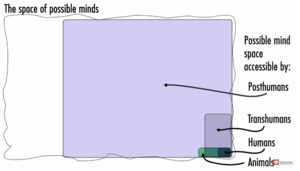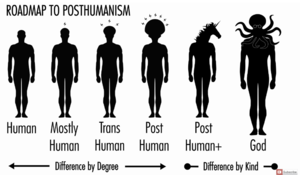Posthuman transhumanism

Posthuman transhumanism or to be posthuman refers to a state of existence beyond the limits of transhuman biological immortalists, transcending definitions of humanity into to era of posthuman existence.
This specific form of posthumanism is a realisation of the most advanced and speculative transhumanist ideas dealing with the technologies and forms of the far future. Typically mind uploading or similar forms of consciousness transfer will be involved to reach this state. The entity may be super intelligent.
In a spiritualist tradition, the idea may be influenced by the Omega Point[1] or Pleroma[2]
Boundary definitions[править]


Adam Ford suggests the following distinctions from more mainstream transhumanism:[3]
One whose basic capacities so radically exceed those of present humans as to be no longer ambiguously human by our current standards
May have gone beyond human form
May have updated the genetic kernel - or even discarded it during a complete overhaul
Archetypes[править]
- Formless:
- Infomorphs - living as a transient energy being of some kind
- Avatars - existing in different bodies or transhuman forms such as a cyborgs
- As Simulations - existing within one or more simulations
- A merger of humanity and artificial intelligence into a singleton, without ties to biological form or even human-like thought
- Omega Point - existing as a God-like omnipotent force permeating the universe
- Formed:
- Matrioshka or Jupiter brain[4] - existing as a massive ultra dense engine of computation, or even further up the Kardashev scale[5]
- A hive mind may function collectively as a posthuman form of existence, though individual members are typically transhuman
Examples in fiction[править]
- The mainstream pop-culture concept of extraterrestrial beings may consider them as either as transhuman or posthuman beings
- The Vorlons from Bablyon 5 are energy based infomorphs that interact with the younger races via cyborg body avatars
- The Star Child from 2001: A Space Odyssey is some kind of transhuman or infomorph
- The First Sirian Bank in The Dark Side of the Sun[6] is a computronium matrioshka brain
- The Sentient Intelligence 'SI' in the commonwealth saga is a friendly superintelligence[7]
- Star Trek
See also[править]
External links[править]
References[править]
- ↑ Wikipedia:Omega Point
- ↑ Wikipedia:Pleroma
- ↑ Will we become posthuman?- Adam Ford
- ↑ https://en.wikipedia.org/wiki/Matrioshka_brain
- ↑ https://en.wikipedia.org/wiki/Kardashev_scale
- ↑ https://en.wikipedia.org/wiki/The_Dark_Side_of_the_Sun
- ↑ https://en.wikipedia.org/wiki/Commonwealth_Saga#Sentient_Intelligence
- ↑ https://en.wikipedia.org/wiki/Star_Trek_V:_The_Final_Frontier